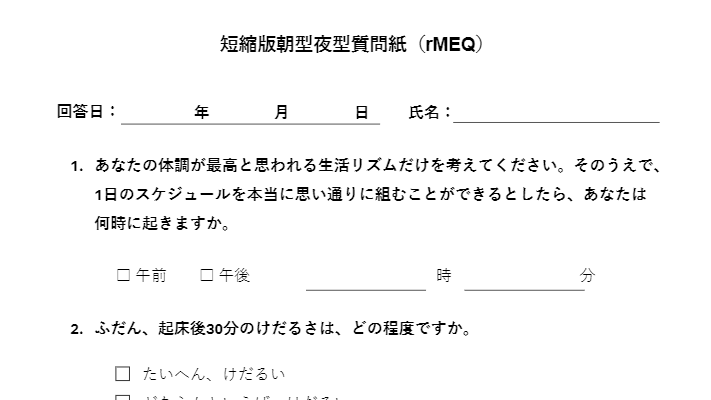19項目のMEQから5項目を抽出して構成されるrMEQの日本語版の信頼性と妥当性の検証
要点
- 19項目で構成されるMEQはクロノタイプ(朝型夜型)を推定するのに広く使われている質問紙ですが、回答に時間がかかることがデメリットとなっていました
- そこで19項目から5問だけを抽出したrMEQ(reduced morningness-eveningness questionnaire)が多くの言語で開発・検証されましたが、日本語版の検証は行われていませんでした
- そこで本研究では、確認的因子分析などを用いて日本語版rMEQの信頼性および妥当性の確認を行い、一定程度の信頼性・妥当性を確認しました。
内容
クロノタイプ(朝型夜型)は一般的にMorningness-eveningness questionnaire(MEQ)を用いて評価されてきましたが、これは19項目で構成されており、特に大規模な調査においては調査対象者にとって負担となっていました。
そこで、クロノタイプを判定するための感度が特に高いとされた5問をMEQから抽出したreduced MEQ (rMEQ) が開発されましたが、日本語版の妥当性検証はまだ行われていませんでした。
そこで、私たちは既存の日本語版MEQの回答データ(N=2213)からrMEQの5問を抽出して、日本語版rMEQの検証を行いました。
結果、朝型-夜型を評価するための堅牢な一因子構造を確認的因子分析で確認することができました(GFI = 0.984、AGFI = 0.951、CFI = 0.935、およびRMSEA = 0.091)。信頼性は、CronbachのαとMcDonaldのωを使用してrMEQ項目の内部一貫性を評価し、値はそれぞれ0.618と0.654でした。
rMEQスコアはMEQスコアと強く相関(ρ = 0.883、p < 0.001)し、rMEQとMEQの間の分類合意(朝型、中間型、夜型)は77.6%(CramerのV = 0.643、Weighted Cohen’s κ = 0.72)でした。
したがって、日本語版rMEQはクロノタイプを効率的に評価するために有用なツールであると結論付けました。これまでは質問項目が多いためにクロノタイプの計測を見送っていた場面で、クロノタイプの計測が可能となることが期待できます。
質問紙と採点方法
rMEQはMEQの質問番号1,7,10,18,19で構成されます。
MEQと同じ採点方法で各設問を採点してスコアを合計し、4-11点が夜型、12-17点が中間型、18-25点が朝型と判定されます。
関連情報
- 続報として、日本語版rMEQの妥当性を生理値などの客観的指標で検証しました。
- こちらで紹介しています。
Abstract
Circadian typology, or “morningness” and “eveningness,” is generally assessed using the Morningness-Eveningness Questionnaire (MEQ), a 19-item scale that could be burdensome in large-scale surveys. To overcome this, a 5-item version known as the reduced morningness-eveningness questionnaire (rMEQ), which is sensitive to the assessment of circadian typology, was developed; however, a validated Japanese version of the rMEQ is yet to be established. This study aimed to develop and validate the Japanese version of the rMEQ. Five essential items for the rMEQ were selected from existing Japanese MEQ data (N = 2,213), and the rMEQ was compiled. We conducted a confirmatory factor analysis for the psychometric properties of the rMEQ and confirmed its robust one-factor structure for evaluating morningness-eveningness (GFI = 0.984, AGFI = 0.951, CFI = 0.935, and RMSEA = 0.091). Reliability was evaluated via internal consistency of rMEQ items using Cronbach’s α and McDonald’s ω, and the values were 0.618 and 0.654, respectively. The rMEQ scores strongly correlated with MEQ (ρ = 0.883, p < 0.001), and classification agreement (Morning, Neither, and Evening types) between rMEQ and MEQ was 77.6% (Cramer’s V = 0.643, Weighted Cohen’s κ = 0.72), confirming the validity. The Japanese rMEQ may be a valuable tool for the efficient assessment of circadian typologies.
Keywords: Circadian typology; eveningness; morningness; rMEQ; validation.
論文情報
| 掲載誌 | Chronobiology International |
| 論文タイトル | The Japanese version of the reduced morningness-eveningness questionnaire |
| 著者 | Eto, T., Nishimura, Y., Ikeda, H., Kubo, T., Adan, A., & Kitamura, S. |
| DOI | 10.1080/07420528.2024.2334048 |
| Accepted Manuscript | Eto.etal_rMEQJ.pdf |



